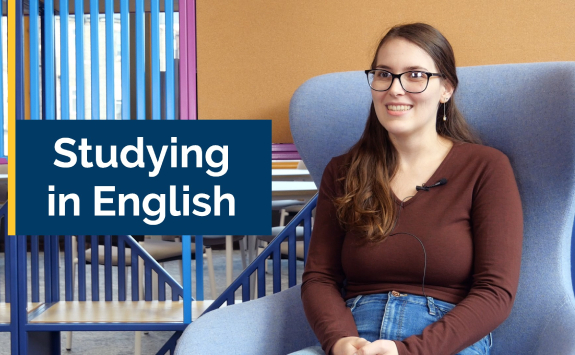Studying in English
Studying in a second language brings many opportunities, but sometimes it can be challenging, too.
When we read in a second language, we often encounter words and phrases we do not understand. We need to think about how we manage this, and why we are reading. When we read academic texts, we need to understand their key points and their overall meaning. We do not need to understand every single word.
Sometimes, students try to check the meaning of every single new word or phrase. But this is a very slow and tiring way to study. It’s not really effective or sustainable. To make faster progress, we need to choose which new language we check, and which we do not. This isn’t about being lazy - it’s about using our time and energy effectively. Students can find this uncomfortable at first. They sometimes worry that they may miss essential information, and it’s true this is possible. However, there are also risks if we don’t skip over any unfamiliar language. We may waste time understanding things we don’t need to, meaning we don’t have enough time and energy for things we really do need to understand.
Need to know, or just nice to know?
We need to decide how important new language seems to be for understanding the text’s wider meaning. Do we really need to know what it means? Is it essential for understanding the text? Or can we understand the text without this individual word or phrase? And how can we tell the difference?
Need to know
Essential language is more likely to be used repeatedly in a text. If the same new words and phrases new keep appearing, you should check what they mean. Essential language is also more likely to be used in the most important sections of the text, for example:
- Abstracts
- Introductions
- Conclusions
- Topic sentences (first sentences in a paragraph)
- Summary sentences (final sentences in a paragraph)
When you discover essential new language, remember to record it.
Just ‘nice to know’
Non-essential words and phrases are less likely to be used repeatedly and in the most important sections of the text. This means they are less important for understanding the text’s wider meaning.
To make faster progress, you may need to skip over these unfamiliar words and phrases without checking their meaning. Remember you can always go back again and check them later if you find you need to.
Using translation software
Students sometimes use translation software during their studies, and this can be helpful in some situations. However, it’s important to use it in moderation, because using it too often can have disadvantages.
If you rely on translation software too much, your brain will get less practice at working out the meaning of words and phrases from the wider context. This may mean your English language skills do not develop as quickly.
Using translation tools during in-person teaching (such as lectures, seminars and tutorials) can also have disadvantages. If you’re looking at a screen too much, you may be less aware of other kinds of communication, such as facial expressions, gestures, and tone of voice. This can limit your participation and your interaction with other people.
Also, remember you will not be able to use translation software during university exams. This is another reason to avoid relying on it too much.
The University has information on the use of AI tools including guidance on how to use these ethically and responsibly which all students are encouraged to read.

Accessing support
The Academic Skills Kit has lots of resources and guidance to help you study more effectively, including:
- The strategic reading framework
- Note-taking strategies
- Note-taking in lectures
- How to improve your grammar
You can also book a one-to-one appointment with the Academic Skills Team to discuss strategies for developing your study skills.
Undergraduate students who don’t speak English as their first language can access English language support and resources through Newcastle University International Study Centre.
Studying in another country isn’t only about academic work. It also gives you opportunities to immerse yourself in a different culture. Try to explore some of the many ways to develop your skills outside your studies.
This might mean reading articles or listening to podcasts about things you find interesting. Newcastle University Students' Union (NUSU) also has a wide range of societies for people who share a hobby or an interest, and joining these is another great way to meet like-minded people and develop your language skills.
Using English regularly in your free time is one of the best ways to build your communication skills and your confidence.


